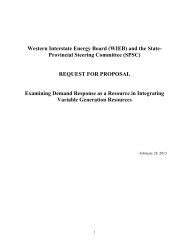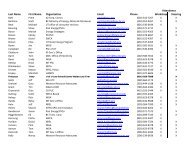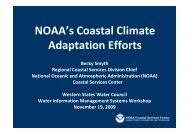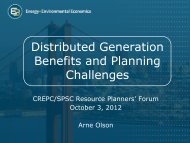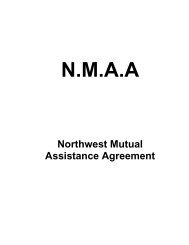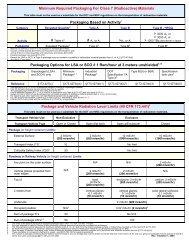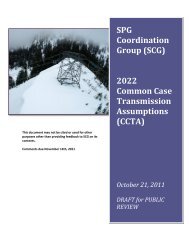WRAT Final Briefing Paper - Western Governors' Association
WRAT Final Briefing Paper - Western Governors' Association
WRAT Final Briefing Paper - Western Governors' Association
You also want an ePaper? Increase the reach of your titles
YUMPU automatically turns print PDFs into web optimized ePapers that Google loves.
The ambiguities that could be tolerated when utilities provided equity funding for resources<br />
they owned become problematic in circumstances where merchant generators are borrowing<br />
money to build speculative merchant power plants for spot markets. The uncertainty of<br />
responsibility to serve load and of cost recovery for good faith power purchases stemming<br />
from competitive or hybrid market forms are an anathema to financial markets. One way that<br />
these uncertainties can be reduced is by creating explicit resource adequacy requirements that<br />
restate the obligation of LSEs to make forward power purchase commitments. They can also<br />
be reduced, particularly in a retail access environment, by requirements that potential LSEs<br />
need to have sufficient financial resources to honor bilateral contracts. This is particularly<br />
important in a retail access environment.<br />
It is not clear that building for spot markets will be the dominant activity of merchant<br />
generators in the future, because of the significant uncertainties about the overall level and<br />
timing of cost recovery, even in the absence of price caps (more on this issue below).<br />
However, whether or not merchant generators build, potential incentive problems can exist in<br />
a hybrid market structure. When responsibility to provide the resources to serve the load of<br />
specific classes of end-users is not clearly established and information about the expected state<br />
of the market is poor or lacking, there are incentives for LSEs to hold back from revealing the<br />
extent of their needs and from being aggressive about forward contracting, in hopes that their<br />
competitive position will be maximized.<br />
Similarly, there are incentives for merchant generators to hold back on revealing their plans<br />
for construction in order to enhance their negotiating position. The combination of these two<br />
sets of incentives can lead to, or exacerbate, boom and bust cycles in the generation market,<br />
which can lead, in turn, to high spot prices and high spot market exposure.<br />
Merchant generators also have different incentives than regulated generators to hold<br />
marginally uneconomic plants available for emergency operation. A plant owned by and in<br />
the rate base of a regulated utility can be held for emergency purposes even if it is extremely<br />
inefficient and costly to operate, if the regulator agrees that keeping the plant in service is<br />
prudent. The financial risk to the owner of such a plant is minimal, particularly if it is also<br />
covered by some sort of fuel cost adjustment clause. Merchant generators, on the other hand,<br />
have to recover all their costs through market operations, either forward contracts or spot<br />
market sales. If they have no expectation of profitably running an aging generator, under<br />
these conditions, they have no incentive to keep the plant available. The site itself may be<br />
more valuable than the plant. This generally makes forecasting plant availability more<br />
difficult and uncertain; it could also lead to unplanned shortfalls that do not allow replacement<br />
capacity to be brought on line in time to maintain even operating reserve requirements.<br />
II.C Retail Access Reduces Clarity of Adequacy Assessment and Responsibility<br />
In hybrid market situations where retail access components exist, particular problems arise.<br />
An increasing scope of direct access (or retail choice) compared to traditional monopoly<br />
4<br />
<strong>Final</strong> Consensus Draft<br />
Westwide Resource Assessment Team



